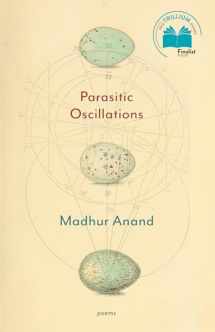
Parasitic Oscillations: Poems
Book details
Summary
Description
Product Description "Anand's attention to and ability to evoke explicit, exponential beauty in scientific and natural form are simply stunning. . . . Anand's debut is in every measure a triumph." –Publishers WeeklyA stunning new collection of poems that examine various aspects of living and practicing as both a poet and scientist in the Anthropocene during a time of unravelling. The poems in Madhur Anand’s second collection interrogate the inevitability of undesired cyclic variation caused by feedback in the amplifying devices of both poetry and science. There are several interacting currents: the poet’s own work between the arts and the sciences, living between North American and Indian cultures, as well as examining contemporary environments through the lag effects of the past. Weaving in a close reading of A.O. Hume’s The Nests and Eggs of Indian Birds (1889), anticolonial, intertextual, feminist, electronic, and diasporic relationships are examined against the backdrop of unprecedented ecological collapse. Here, birds are often no longer direct subjects of metaphor, but rather remain strange, sometimes silent, a kind of menacing and stray capacitance, but can still act as harbingers of discovery and hope. Fluctuating through extreme highs and lows, both emotional and environmental, while examining a myriad of philosophical and ethical dilemmas, Parasitic Oscillations is an enlightening, thought-provoking, and profoundly beautiful work that both informs and questions. Review Praise for Madhur Anand and Parasitic Oscillations"With Parasitic Oscillations, Madhur shares a poesis of natural history collections... She transports us to the 19th century via a collection of Indian eggs and birds by A.O. Hume (1829–1912), grounds us in the present, and encourages our minds to wander into futures. Unlike any poetry collection I’ve encountered before, bird songs are the reward on a QR code treasure hunt. The codes overlayed on images of specimens, functional – to be scanned, then transported across space and time to where the Nilgiri laughingthrush sings, reminding us it is still here. ... The final poem is one of the longer, if not longest, of Madhur’s that I have read. I was delighted to then learn in the footnotes that the poem was written through collaboration – a sort of call and response – between Madhur and other artists, scientists, and species. I find the approach used to create the final poem an exciting way to write at the intersection between science and art – one that might speak to others given its potential for creating conversation between humans and non-humans through relational writing. You will find grounding and flight with Parasitic Oscillations." —The Niche "It’s such a distinctive and important book. In one sense, it’s a book about colonialism—environmental and otherwise. In another, a meditation on places and family. And it’s obviously churning with pointed ecological impetus. But it’s so much more than any of those themes, and more nuanced. More playful, and yet exigent . . . That phrase 'stray capacitance' comes up at least three times. And there should be a literary phrase like that for the energizing technique [she has] of displacing a predictable syntactical trajectory with a kind of metonymic substitution. . . . So brilliant. So fun. So constantly standing up the dendrites in my brain." —Forrest Gander, Pulitzer-prize winner and author of Twice Alive“Not only does Anand repurpose scientific language, but she also makes use of figures, diagrams and photographs to expand the possibilities of the poem. Below a diagram of a phase plane portrait of a mathematical model of birdsong, Anand writes, ‘Superimposing the concept of diaspora on the movement of bird specimens around the world, tracking the co-movements of natural and cultural histories to bring to light the oscillatory, but ultimately entwined interrelations of humans and nature.’ This grounding in connection leads Anand to shift perspe


We would LOVE it if you could help us and other readers by reviewing the book
Book review



